
Joint Staff Surgeon Praises Americans Stepping Up to Help COVID-19 Victims
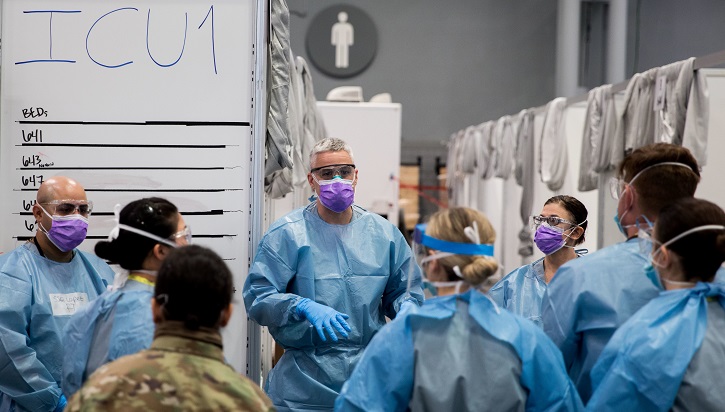
Army Maj. Sean Shirley, assigned to the 9th Hospital Center, holds a meeting with his staff in the Javits New York Medical Station intensive care unit bay in New York City. April 4, 2020. The facility, which has been operational and caring for non-COVID-19 patients since March 30, began providing medical care for patients with the virus on April 3. (Photo By Navy Chief Petty Officer Barry Riley)
Any listing of personnel, equipment and facilities involved — as impressive as it might be — doesn't begin to explain what's at the heart of the Defense Department's effort to combat COVID-19, the Joint Staff surgeon said.
It's about people helping people, flattening the curve, and slowing the spread of the pandemic so hospitals have a bit more time to prepare for the total number of patients, Air Force Brig. Gen. (Dr.) Paul Friedrichs said during a Pentagon news conference yesterday.
And it's about saving lives, he added.
Friedrichs thanked the reservists who stepped forward when the call went out for volunteers and mobilized on short notice.
"In fact, many of them are moving to New York as we speak," he said. "These are folks who identified that they could leave their communities and support the broader effort back in uniform."
New York City is the hotspot for COVID-19 in the United States. The Navy hospital ship USNS Comfort is there. An Army field hospital is operating out of the Javits Convention Center. These are there to supplement the hospitals of the city and support the medical teams.
"We would all be very happy if there's not a surge of patients that overwhelm the New York hospitals," Friedrichs said. "But the people of New York need to know that if the hospitals are full, we're there, and we will deliver great care to them."
The reservists that DOD is sending to New York are going to augment the hospitals so that the hospitals can use their beds and their intensive care units primarily for COVID-19 patients, the general noted.
The COVID-19 pandemic requires all people to do their parts, the doctor said. "It starts with each of us as individuals. We have got to share the responsibility for protecting not only our families, but protecting our communities," he said. "In the military, we do that every day. This is now part of what we as a nation have to do for each other."
Friedrichs said the entire country is stressed by this dangerous outbreak, and medics are, too. "Is it what we signed up for when we became doctors or nurses or pharmacists? Yeah, we knew we were going to take care of sick people," the doctor said.
"Part of our commitment in the Department of Defense is to ensure that our medics have the protective equipment that they need so they can deliver the care that their patients need," Friedrichs said. "That doesn't reduce the stress much, but that is part of that shared commitment going forward there."
Today, the big hotspot is New York, but it could be another community next week, he noted. The federal effort is a balance of risk, he explained — anticipating the needs and the timing of where the next hot spot will be while concentrating efforts on the current one.
"Right now, the biggest threat is in New York City. And so we are accepting risk in other communities by moving medics who normally work in other communities up to New York to help out those folks who are dealing with a really tough time right now," Friedrichs said. "We anticipate as this continues to evolve, that we're going to adjust where we are and who we're taking care of based on the demands of each community [and] what they need at that moment in time."
The cry of "flatten the curve" as an important measure in slowing the spread of the virus so that hospitals will have more time to prepare is familiar to most Americans. Now, more than ever, the military medics have a pivotal role to play, the Joint Staff surgeon said.
"Part of what we're trying to do as military medics is to help communities so that they have enough capacity that if someone needs care, they can get it until we can get beyond that peak in that particular community," Friedrichs said. "I think so far we've been able to do that."
A total of 700 medics volunteered to aid the effort. "These are men and women who stepped up when we asked for volunteers and said that they were willing to leave their communities," the general said. "I don't have a breakdown for all 700 of them as far as where they're coming from. We have 125 Air Force reservists who are going to New York, we have 200 Navy reservists, who are also going to New York."
"Then we've got a variety of other teams, reserve teams, that are going to New Jersey and to Connecticut," he continued. "The American people are recognizing this is not business as usual, and people are stepping up to help each other out. And that is exactly what you're seeing with these reservists. My hat's off to them because they have chosen to leave their homes and come forward when we asked for volunteers to help out. So where do they come from? They come from America. This is what we're doing. We're each stepping forward to help each other out."
Disclaimer: Re-published content may be edited for length and clarity. Read original post.
Defense Health Official Urges Personnel, Families to Wear Face Masks
Article
4/8/2020
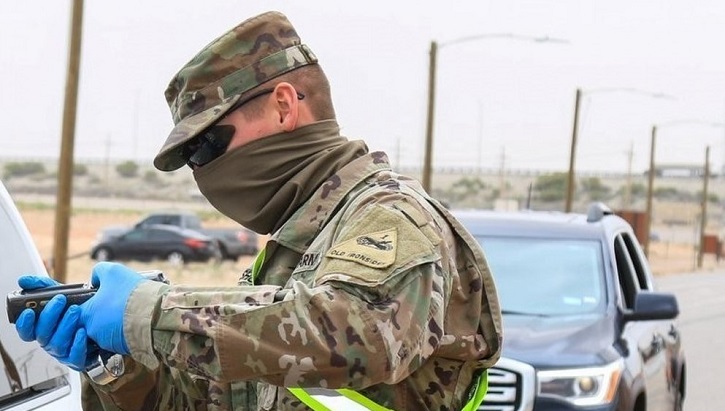
The face-covering mask can be fashioned from simple household items.
VENDOR UNSOLICITED PROPOSAL IN SUPPORT OF COVID-19
Form/Template
4/7/2020
Unsolicited Proposal Information Supporting COVID-19
New York City emergency room doc joins Air National Guard as flight surgeon
Article
4/6/2020
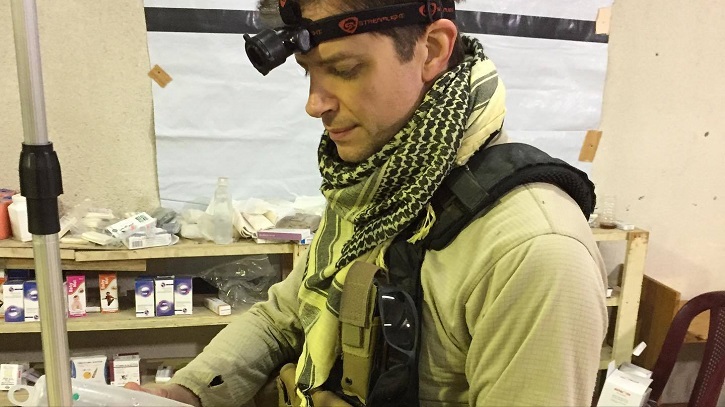
Paladino is Associate Professor of Emergency Medicine at SUNY Downstate Medical Center and also at Kings County Hospital Center.
DoD Guidance on the Use of Cloth Face Coverings
Publication
4/5/2020
Effective immediately, to the extent practical, all individuals on DoD property, installations, and facilities will wear cloth face coverings when they cannot maintain six feet of social distance in public areas or work centers (this does not include in a Service member's or Service family member's personal residence on a military installation).
Policy on Accessions and Accessions Training during the COVID-19 Outbreak
Publication
4/3/2020
The Military Departments must seek ways to maximize accessions in a responsible manner to minimize a reduction in military end strength and the potential deterioration of mid-and long-term readiness and capacity.
It’s complicated: Our relationship with social media
Article
4/3/2020
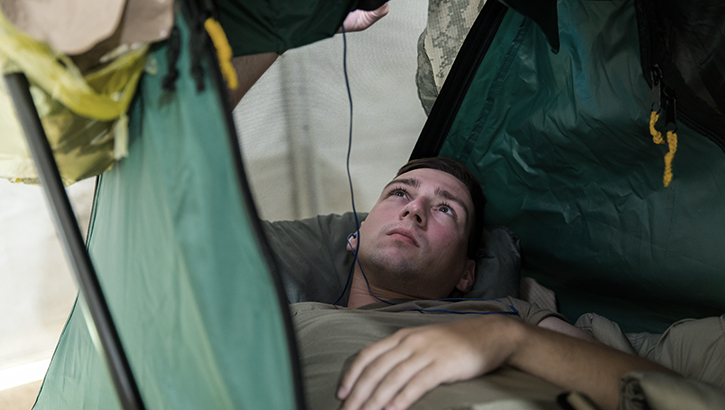
COVID-related story on perils of social media
250-patient Army field hospital in Seattle expected to open next week
Article
4/3/2020
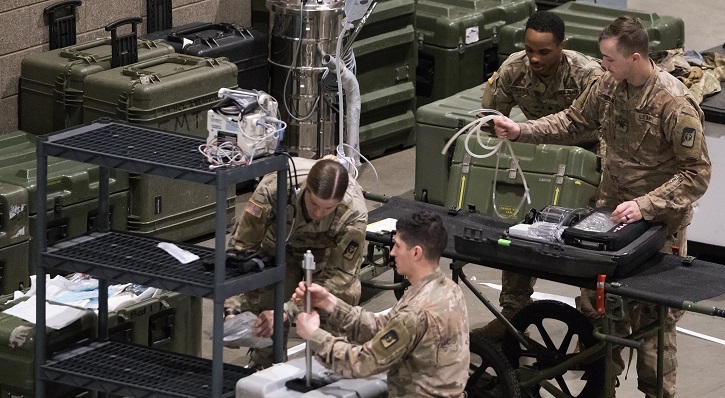
The field hospital...will relieve some of the burden on local hospitals, allowing them "freedom of maneuver" to better take care of patients who have COVID-19
Navy secretary visits hospital ship Mercy in Port of Los Angeles
Article
4/2/2020
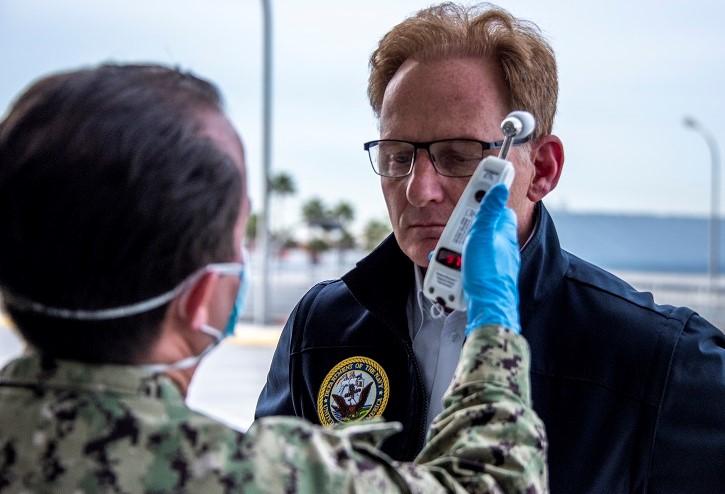
Mercy deployed in support of the nation’s COVID-19 response efforts, and will serve as a referral hospital for non-COVID-19 patients currently admitted to shore-based hospitals.
Exemption - Stop Movement for Travel for DoD Components in Response to COVID-19
Publication
4/1/2020
DoD personnel supporting presidential support duties are exempt from the "Stop Movement for Travel" directive
From the front lines to the home front, Military Medicine is always ready
Article
4/1/2020
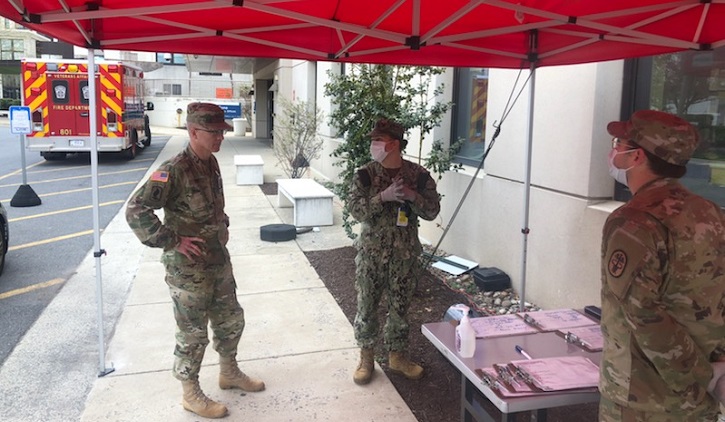
Military medicine is providing assistance in unprecedented ways
Tiered Telehealth Health Care Support for COVID-19
Publication
3/31/2020
This memorandum establishes guidance for the use of Telehealth (TH) Information Technology (IT) tools in support of the clinical care required for patients across the spectrum of COVID-19 illness
Pharmacy Guidance for Market MTFs
Publication
3/31/2020
Message to Pharmacy Beneficiaries regarding military pharmacy services during the COVID-19 pandemic.
Possible changes at MTF pharmacies in response to COVID-19
Article
3/31/2020
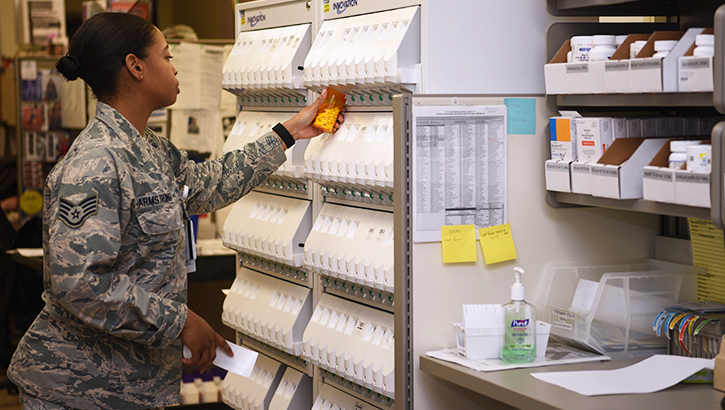
Find out the latest pharmacy policies at MTFs
Meeting Italian COVID-19 requirements, Army reopens dining facility
Article
3/31/2020
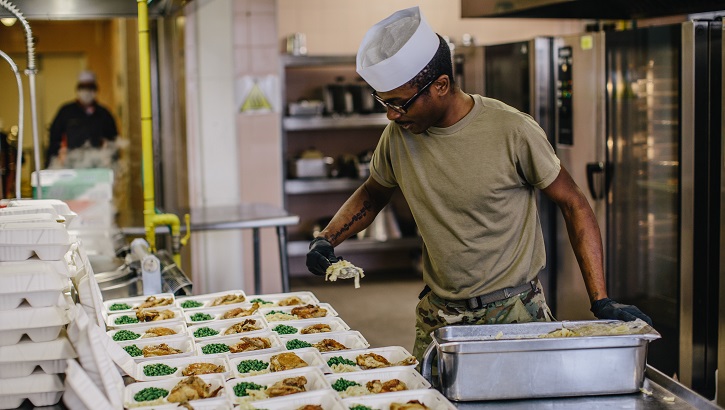
The dining facility is fully operational, even providing food deliveries to people in quarantine
Coping with the stress of social distancing
Article
3/31/2020
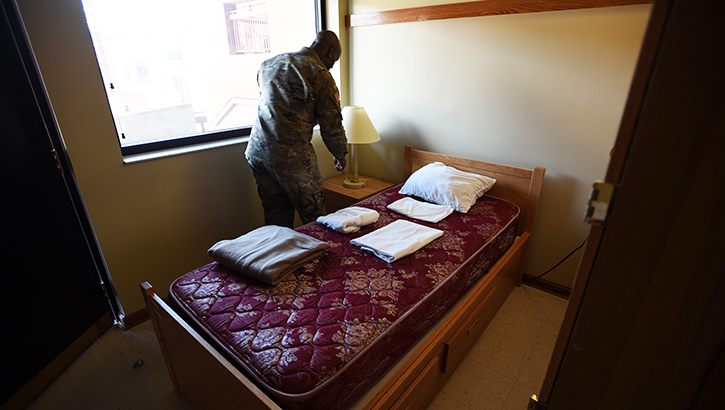
How to navigate the COVID-19 outbreak































No hay comentarios:
Publicar un comentario